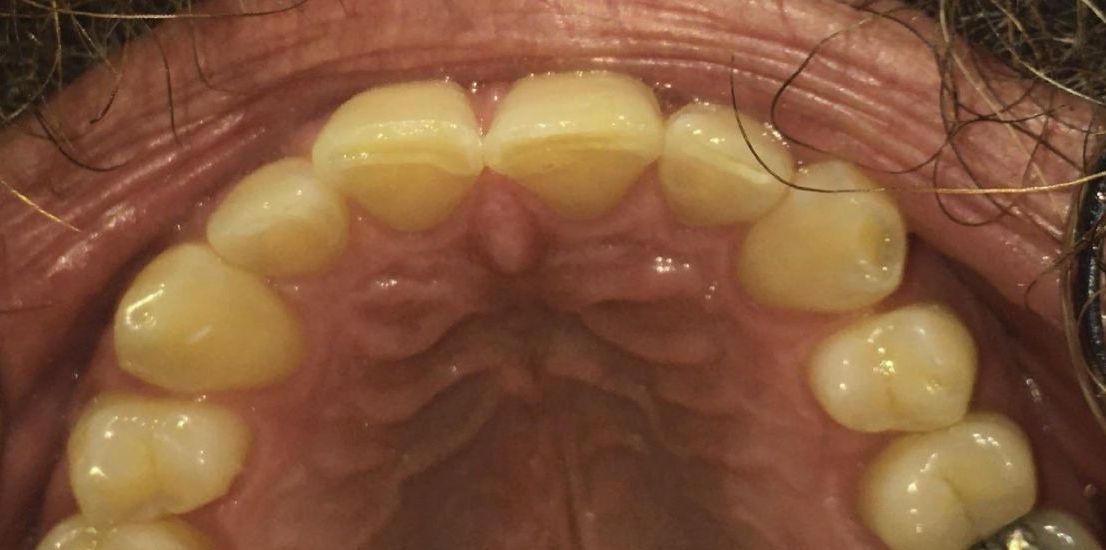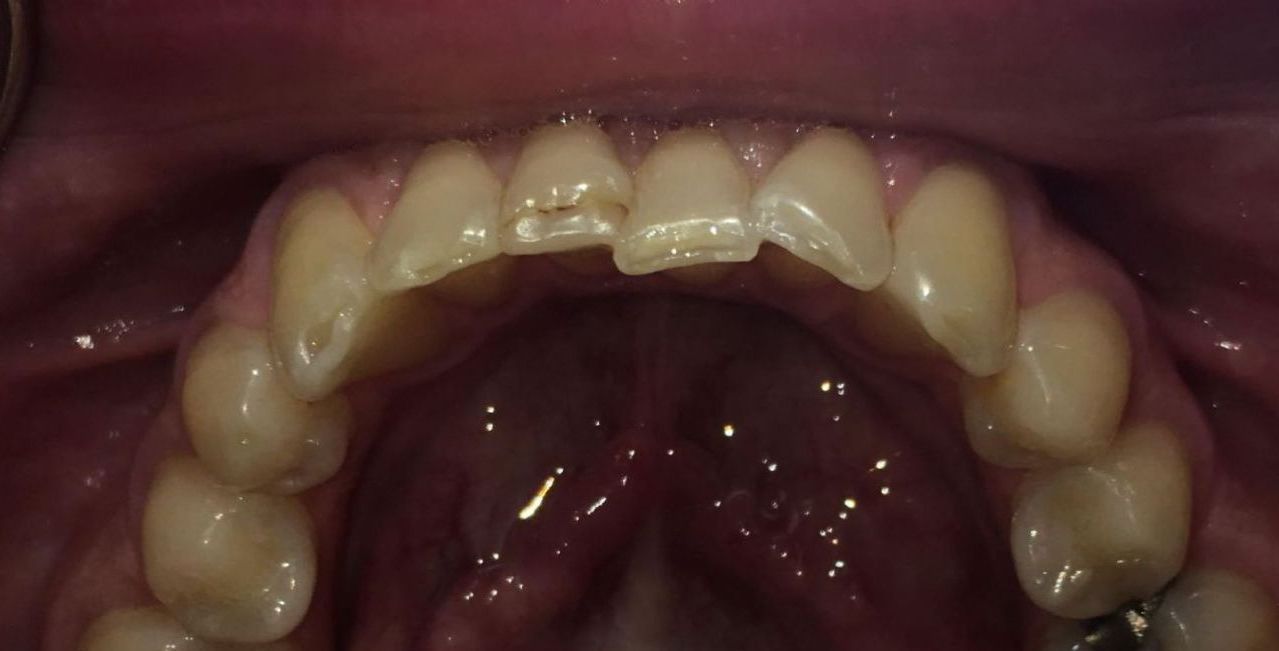Are you Having Joint Pain?


Clenching and Grinding a symptom of TMJ Disorder
Patient "Kevin" is suffering from post-traumatic stress disorder (PTSD) which has resulted in severe clenching and grinding during both daytime and nighttime hours. This chronic behavior is causing various dental issues, including pain in the temporomandibular joint (TMJ) and wear and chipping of several key teeth. If left untreated, Kevin's condition may lead to the requirement for full mouth reconstruction with zirconia crowns, in an effort to preserve his vertical dimension and limit the degradation of the articular disk. Tooth pain from severly overworked, chipped and broken teeth seem to be exacerbating his PTSD symptoms. It is a vicious cycle that must be broken.
Clenching and Grinding Effects on Oral Health:
Clenching and grinding, known as bruxism, is often associated with stress and anxiety-related disorders such as PTSD. Kevin's severe clenching has resulted in wear and tear on his teeth, the results are easily seen in his clinical photos where generalized moderate to severe wear can be seen along with many teeth chipping and breaking. The presence of moderate generalized wear and specific dental issues like a chipped upper right canine and a broken cusp on the lower left second molar indicates the intensity of his clenching episodes. Kevin has even reported finding pieces of his teeth in his mouth, highlighting the severity of the problem. A night guard was made for him and that has helped but It is not easily worn during the day as Kevin interacts with others and performs his daily business. A night guard increased the vertical dimension and also helps limit positions that exacerbate his TMJ symptoms.Full mouth reconstruction can improve the position of the teeth, strengthen the remaining teeth by enclosing sensitive dentin inside a zirconia shell, and maybe most importantly restore or improve vertical dimension. By controlling vertical dimension the condylar position can be controlled during the time Kevin is not wearing the bite/night gaurd. This would be an optimal treatment option for Kevin but it comes with a steep price tag as all upper or lower teeth must be crowned at a minimum. Cases are even more predictable if both arches are crowned. If that is 28 teeth, 28 x ($) = significant investment. $28,000 if each crown is 1000 dollars. Needless to say this treatment would change Kevin's current situation drastically as 24 hours a day Kevin's teeth would be in optimal position for his TMJ.
A bite guard, also known as a mouth guard or occlusal splint, is a dental device designed to protect your teeth and alleviate the stress placed on your temporomandibular joint (TMJ), which can help preserve the articular disk of cartilage within the joint. The articular disk of cartilage, also called the TMJ disc, is a critical component of the TMJ that allows for smooth jaw movement. It is situated between the condyle of the mandible (lower jaw) and the temporal bone of the skull.
Here's how a bite guard helps in preserving the articular disk of cartilage:
- Stress Reduction: Bite guards are commonly used to reduce the effects of bruxism, a condition characterized by teeth grinding or clenching. When you grind or clench your teeth, it generates significant force and pressure on the TMJ. Over time, this can cause wear and tear on the articular disk, leading to damage. A bite guard acts as a cushion and absorbs some of the forces, thereby reducing the stress on the joint.
- Proper Jaw Alignment: Misaligned teeth or an incorrect bite can put excessive pressure on the TMJ, leading to disk-related issues. A bite guard, when properly designed and fitted, helps in maintaining proper jaw alignment and reduces the risk of strain on the articular disk.
- Temporal Mandibular Disorder (TMD) Management: TMD is a group of conditions that describe current problems in the TMJ.
- Promotes Relaxation: Some types of bite guards are designed to create a separation between the upper and lower jaws, promoting muscle relaxation in the jaw area. This relaxation reduces tension and decreases the chances of joint-related issues.
It's important to note that bite guards should be custom-made by our dentist in Tarzana to ensure a proper fit and effectiveness. Over-the-counter mouthguards may not provide the same level of protection for your teeth and the articular disk within the TMJ. Additionally, a dentist can monitor your condition and adjust the bite guard as needed to ensure its long-term effectiveness in preserving the articular disk of cartilage and maintaining overall oral health.
About Dental Plus Tarzana
WHERE TO FIND US
Dental Plus Tarzana Business Hours
Mon - Thur 9am - 5pm
Fri - Sat By Appointment only
Sunday Closed
CONTACT
818-881-2333
dentalplustarzana@gmail.com
CROWNS IN A DAY IN TARZANA
DENTAL IMPLANTS IN TARZANA
TEETH WHITENING IN TARZANA
DENTAL ORTHODONTICS IN TARZANA
DENTAL MAINTENANCE IN TARZANA
CLEANING AND HYGIENE IN TARZANA
HIGH TECH DENTAL EXAMS IN TARZANA
DENTAL RESTORATIONS IN TARZANA
DENTAL FILLINGS IN TARZANA
DENTAL EXTRACTIONS IN TARZANA
Dental Plus Tarzana © 2023
Thomas P. Rennaker, DDS, Inc.
This website does not share any information with any third parties.
